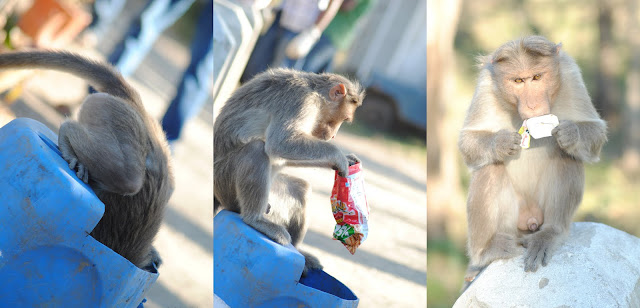Keeping up the momentum of the anti-plastic campaign, thirteen students from the Bharathiar University-Arts and Science College, two enthusiastic school kids and four Shola Trust members started on a cleanup of the Visitor Centre at Theppakadu in the Mudumalai Tiger Reserve (MTR) this Sunday. During the height of the tourist season, over a THOUSAND visitors pass through the Tiger Reserve and unfortunately, we were not surprised at the amount of plastic lying around.
We began with a presentation on the importance of the Nilgiri Biosphere Reserve (NBR) as an ecololgical hotspot. The students listed out quite a few species that are endemic to our home! Since some of the students are seriously considering a career in the civil or forest services with the Government, we spent a little while learning about the structure of the Forest Department bureaucracy of the MTR. After lunch at the Log House, we put on our gloves, got our sacks ready and began to pick up plastic from around the elephant camp. We met Semmozhiyaan, the baby elephant who lives at the elephant camp. He’s fed 20 litres of milk everyday and we ended up collecting a whole lot of lactogen foil packs, which are terribly difficult to recycle or reuse!
After an hour of picking up plastic and bottles at the elephant camp, we moved down to the roads. The road side was filled with all sorts to plastics ranging from disposable plastic water bottles and cigarette cases to candy and sweet wrappers. Once on the road, people began to notice we were up to something. The surgical gloves we were wearing to keep our hands clean helped in gaining attention of the tourists. By then, we had collected eight huge bags of plastic. With our sacks filling up in no time, we decided to have a tea-break and do some visitor interaction around the ticket counter.
The Reception of the MTR has an information center and museum. Visitors can also take a safari ride into the forest from this central point, so we decided to display the day’s gains here, where everyone could see them! We spoke to visitors, highlighting the problem of plastic and litter. As each van set out on the safari, we spoke to the tourist in Tamil, Malayalam and English, asking them to dispose their plastic waste carefully. The students talked about the “3 Rs” – Reduce, Reuse, Recycle. We learnt that there are two more R’s as well – Refuse and Recover!! As if to demonstrate our point of how animals can eat plastic looking for salt, a Bonnet Macaque was scavenging into a dust bin, picking on banana peels and plastic bags. He even ate a whole carton of Amul butter! This was exactly why we wanted the tourists to avoid plastics in an ecologically sensitive area like Mudumalai. Animals tend to ingest plastics unintentionally. This waste gets struck in the intestine and leads to the death of the animal. There have been cases of many such deaths in this area.

Most of the tourists were receptive and recognized that plastics are a big problem. We hope to have more anti-plastic campaigns, so that the Forest Department takes it to serious levels, and strictly impose rules and fines. As students and volunteers, we will continue to do our part of creating awareness. After a long day, we were treated with a jungle safari ride and we found ourselves quite lucky! We spotted a wild leopard on the side of the road! We also saw lots of spotted deer and a few sambar in the fading light. After dinner at the Log House, we headed off home, along with our bags of plastic waste! We dropped the plastic off at the Vidyodaya School plastic collection point in Gudalur, happy that we had cleared so much out of the forests. Perhaps next time, we’ll be even luckier and have LESS plastic to bring back!
Photo Credits: Shakthi Sritharan